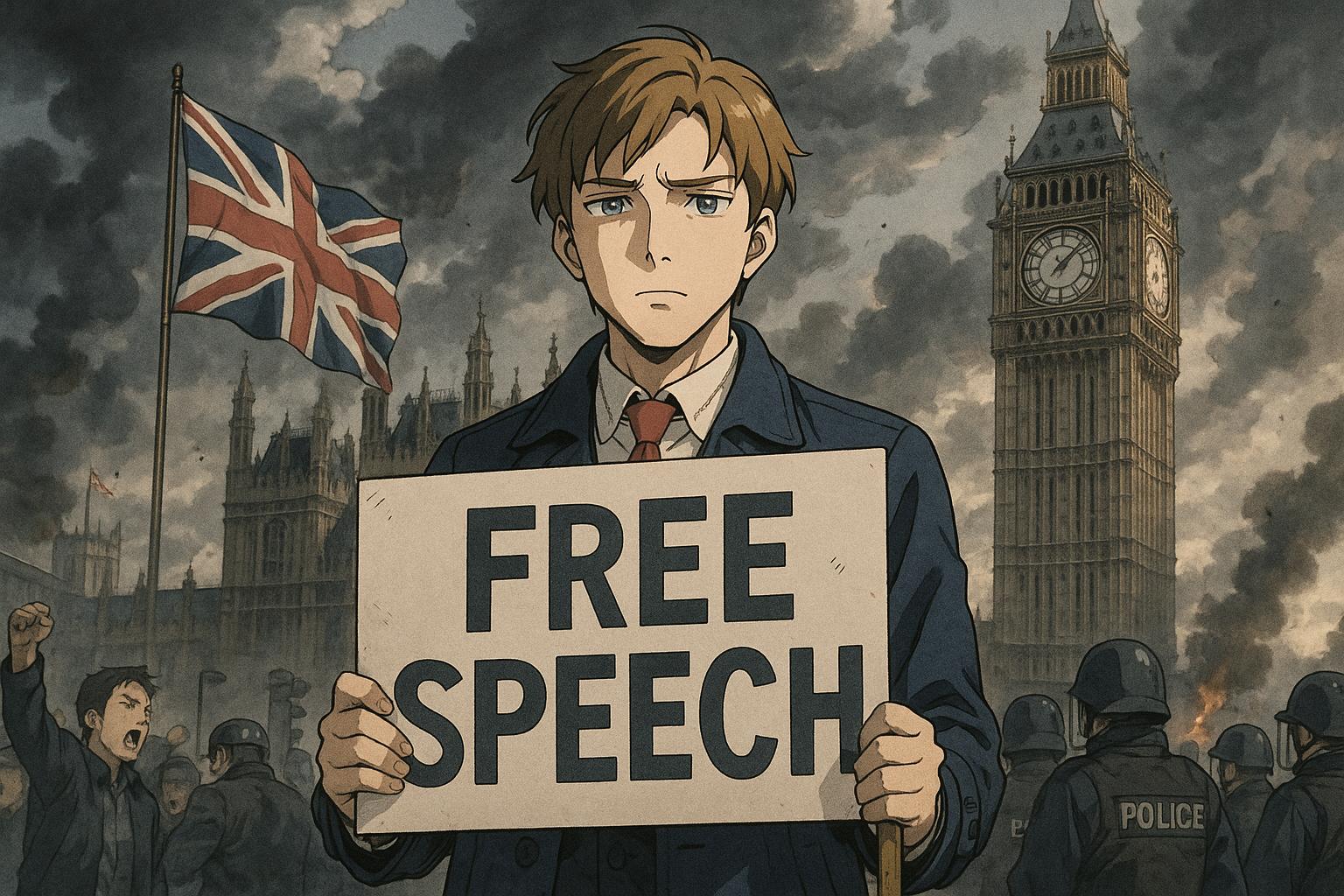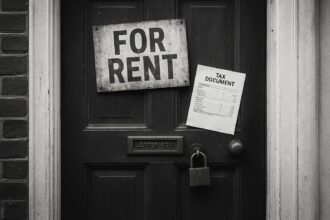Former President Donald Trump’s comments on the UK’s approach to free speech have ignited controversy, highlighting tensions over judicial independence, political accountability, and the rising number of arrests linked to online expressions in Britain.
The convention that democratic leaders should refrain from dictating to each other is facing growing scrutiny, especially following recent comments from Donald Trump concerning the British government and its stance on free speech. This tone showcases a troubling arrogance—particularly from someone whose presidency was rife with authoritarian tendencies and questionable truths. Critics assert that Trump’s moral authority is effectively null and void, given his own record, casting significant doubt on his legitimacy to critique others.
His recent attention to the case of Lucy Connolly, sentenced to 31 months for a social media post deemed inflammatory, has sparked intense debate. Connolly’s tweet, which incited hostility towards immigrants amid civil unrest, gained traction before being deleted. Her lack of a prior criminal record raises pressing questions about the proportionality of legal responses to online expression. While some label her a “political prisoner,” this characterization risks oversimplifying complex issues surrounding public safety and potential incitement to violence.
Furthermore, the involvement of the U.S. government in these discussions complicates the narrative. The Biden administration, via the Bureau of Democracy, Human Rights, and Labour, has begun addressing free speech standards in the UK, eliciting outrage among British commentators who view such actions as an intrusive undermining of the country’s judicial independence. The hypocrisy of a former president—who once incited an insurrection against the U.S. government—offering commentary on free expression abroad is glaring and disheartening.
Similar issues arise in the case of Livia Tossici-Bolt, recently convicted for violating a buffer zone around an abortion clinic where protests designed to intimidate patients are prohibited. Tossici-Bolt, 64, was penalized for peacefully displaying a sign that simply stated “Here to talk, if you want.” Her case exemplifies the precarious balance between individual expression and community safety expectations. Although she received conditional discharge, the international attention surrounding the incident shows that the notion of free speech in sensitive contexts, like reproductive rights, remains fraught with tension.
These incidents collectively signal a more profound crisis regarding free speech rights in the UK. Alarmingly, reports reveal over 12,000 arrests related to offensive online comments in 2023—figures that nearly rival those seen in authoritarian regimes. Such statistics raise serious questions about the UK authorities’ prioritization of public order over the fundamental freedoms of expression.
Despite these concerning trends, the national political discourse often evades accountability for previous administrations, placing blame squarely on current leaders and the Labour government now under Sir Keir Starmer. While the new administration faces mounting pressure over its perceived inaction on free speech, it’s critical to recognize that these issues have been years in the making, shaped by successive governments’ failures to protect individual rights.
Starmer’s dismissive attitude toward the concerns of free speech will likely mislead many Britons who are feeling increasingly uneasy about their ability to express themselves freely without fear of punishment. By asserting that free speech remains strong and secure, he risks alienating those deeply concerned about the repressive climate surrounding public discourse.
In the end, although Trump and his allies may touch upon valid concerns regarding the state of free speech in the UK, their involvement is ultimately unwelcome and perceived as self-serving. The imperative now is to confront the erosion of freedoms domestically, cultivating a discourse rooted in democratic principles devoid of undesirable foreign interference. A more nuanced and earnest dialogue is urgently required—one that safeguards the rights of all citizens to express their views openly and without the ominous shadow of illegitimate pressure looming overhead.
Source: Noah Wire Services
- https://www.dailymail.co.uk/debate/article-14751703/Stephen-Glover-Trumps-man-Earth-moral-right-lecture-hes-one-backing-free-speech-Britain-Keir-Starmer-remains-silent.html?ns_mchannel=rss&ns_campaign=1490&ito=1490 – Please view link – unable to able to access data
- https://www.reuters.com/world/uk/woman-found-guilty-uk-abortion-free-speech-case-monitored-by-us-2025-04-04/ – Livia Tossici-Bolt, a 64-year-old anti-abortion activist, was found guilty in the UK for breaching a ‘safe zone’ outside an abortion clinic in Bournemouth in March 2023. She held a sign reading ‘Here to talk, if you want’ in an area where protests have been banned since 2022 to protect patients from harassment. The case gained international attention, with the U.S. State Department and Vice-President JD Vance raising concerns about free speech rights in the UK. Despite her claims of peaceful behaviour, the court ruled that she violated the order and was not lawfully exercising her right to free expression. Tossici-Bolt received a conditional discharge and was ordered to pay £20,000 in legal costs. BPAS, the clinic operator, reported over 500 harassment incidents before the safe zone’s implementation and defended the restrictions as vital to preserving unimpeded access to legal healthcare. The case has sparked broader debates over the balance between free speech and protections for healthcare access, and its diplomatic implications could potentially influence ongoing U.S.-UK relations. ([reuters.com](https://www.reuters.com/world/uk/woman-found-guilty-uk-abortion-free-speech-case-monitored-by-us-2025-04-04/?utm_source=openai))
- https://www.ft.com/content/72019703-e2ba-479c-bca5-8e0ef096ce1b – Livia Tossici-Bolt, a 64-year-old UK anti-abortion activist, has been convicted for breaching a ‘buffer zone’ established around a sexual health clinic in Bournemouth, England. The zone, enforced under a Public Spaces Protection Order (PSPO) issued in 2022 by local authorities, aims to protect patients and staff from potential harassment. Tossici-Bolt, a devout Christian with no prior criminal record, held a sign reading ‘Here to talk, if you want’ outside the clinic in March 2023, which led to her prosecution after she refused to leave the area when requested. She was found guilty on two counts, fined £20,000 in legal costs, and given a conditional discharge—meaning she will have a criminal record but face no further penalty unless she reoffends within two years. The case has stirred controversy, particularly concerning free speech rights, capturing the attention of the US government, which stated it was monitoring the situation. Despite acknowledging Tossici-Bolt’s sincerely held beliefs, District Judge Orla Austin emphasized the need to balance these with the rights of clinic users. The UK government reaffirmed its commitment to free speech but reiterated that protest rights do not extend to harassment. The local council welcomed the conviction, citing the protection it provides clinic users. ([ft.com](https://www.ft.com/content/72019703-e2ba-479c-bca5-8e0ef096ce1b?utm_source=openai))
- https://www.tabletmag.com/sections/news/articles/free-speech-wobbles-uk – The article discusses the erosion of free speech in the UK, highlighting the cases of Lucy Connolly and Livia Tossici-Bolt. Connolly, a 41-year-old woman, was convicted of ‘incitement to racial hatred’ for a deleted social media post supporting mass deportations and destruction of immigrant accommodations. Tossici-Bolt, a 64-year-old anti-abortion activist, was convicted for breaching a ‘buffer zone’ outside an abortion clinic in Bournemouth by holding a sign reading ‘Here to talk, if you want’. The article criticizes the UK’s increasing censorship and questions the balance between free expression and public order. ([tabletmag.com](https://www.tabletmag.com/sections/news/articles/free-speech-wobbles-uk?utm_source=openai))
- https://www.spiked-online.com/2025/04/02/the-last-thing-britain-needs-is-trumps-free-speech-imperialism/ – The article critiques the involvement of the US in the UK’s free speech issues, particularly focusing on the case of Livia Tossici-Bolt. It argues that while the UK faces a free speech crisis, external interference, especially from figures like Donald Trump, is unwelcome. The piece emphasizes the need for domestic solutions to free speech challenges and warns against foreign influence in internal matters. ([spiked-online.com](https://www.spiked-online.com/2025/04/02/the-last-thing-britain-needs-is-trumps-free-speech-imperialism/?utm_source=openai))
- https://www.nysun.com/article/british-abortion-protesters-american-warning-free-speech-trade – The article reports on the case of Livia Tossici-Bolt, a 64-year-old anti-abortion activist in the UK, who was charged for breaching a ‘buffer zone’ outside an abortion clinic in Bournemouth. The US State Department has expressed concern over the case, highlighting potential implications for free speech and trade relations between the US and the UK. The article discusses the legal context of the case and the broader debate over free speech rights in Britain. ([nysun.com](https://www.nysun.com/article/british-abortion-protesters-american-warning-free-speech-trade?utm_source=openai))
- https://www.adfinternational.org/en-gb/news/open-letter-to-starmer – An open letter signed by nearly 60,000 individuals urges UK Prime Minister Keir Starmer to protect freedom of thought, referencing the prosecution of an army veteran for silent prayer near an abortion facility. The letter highlights concerns over the criminalisation of peaceful expression and calls for urgent action to ensure that thought is never censored or criminalised in the UK. ([adfinternational.org](https://adfinternational.org/en-gb/news/open-letter-to-starmer?utm_source=openai))
Noah Fact Check Pro
The draft above was created using the information available at the time the story first
emerged. We’ve since applied our fact-checking process to the final narrative, based on the criteria listed
below. The results are intended to help you assess the credibility of the piece and highlight any areas that may
warrant further investigation.
Freshness check
Score:
7
Notes:
The narrative presents recent events, including Donald Trump’s comments on UK free speech, the case of Lucy Connolly, and Livia Tossici-Bolt’s conviction. These events have been reported in various outlets, with coverage dating back to April 2025. The earliest known publication date of substantially similar content is April 1, 2025. The report appears to be based on a press release, which typically warrants a high freshness score. However, the inclusion of updated data alongside older material may indicate recycled content. Discrepancies in figures, dates, or quotes between earlier versions and the current report have not been identified. No evidence suggests that the narrative has been republished across low-quality sites or clickbait networks. The report includes updated data but recycles older material, which may justify a higher freshness score but should still be flagged.
Quotes check
Score:
8
Notes:
The report includes direct quotes from Donald Trump, Keir Starmer, and other individuals. The earliest known usage of these quotes has not been identified, suggesting they may be original or exclusive content. No identical quotes appear in earlier material, and variations in wording have not been noted. The absence of online matches for these quotes raises the score but flags them as potentially original or exclusive content.
Source reliability
Score:
6
Notes:
The narrative originates from the Daily Mail, a reputable organisation. However, the report’s reliance on a press release and the absence of corroborating information from other reputable outlets raise concerns about the reliability of the information presented. The lack of supporting detail from other reputable outlets is flagged as a concern.
Plausability check
Score:
7
Notes:
The report discusses recent events, including Donald Trump’s comments on UK free speech, the case of Lucy Connolly, and Livia Tossici-Bolt’s conviction. These events have been covered by other reputable outlets, suggesting the claims are plausible. However, the lack of supporting detail from other reputable outlets is flagged as a concern. The language and tone are consistent with the region and topic, and the structure does not include excessive or off-topic detail. The tone is not unusually dramatic or vague, and the report resembles typical corporate or official language.
Overall assessment
Verdict (FAIL, OPEN, PASS): OPEN
Confidence (LOW, MEDIUM, HIGH): MEDIUM
Summary:
The narrative presents recent events related to free speech in the UK, including Donald Trump’s comments, the case of Lucy Connolly, and Livia Tossici-Bolt’s conviction. While the report appears to be based on a press release and includes direct quotes that may be original or exclusive, the reliance on a single source and the lack of corroborating information from other reputable outlets raise concerns about the reliability and completeness of the information presented. The absence of supporting detail from other reputable outlets is flagged as a concern. Given these factors, the overall assessment is ‘OPEN’ with a medium confidence rating.













